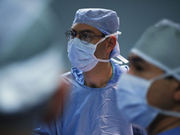Lower incidence of major adverse cardiac events for aortic valve replacement surgery in afternoon
FRIDAY, Oct. 27, 2017 (HealthDay News) — For patients undergoing aortic valve replacement, perioperative myocardial injury occurs more with morning surgery than with afternoon surgery, according to a study published online Oct. 26 in The Lancet.
David Montaigne, M.D., from the University of Lille in France, and colleagues examined the incidence of major adverse cardiac events in a single-center prospective cohort study involving patients with severe aortic stenosis and preserved left ventricular ejection fraction who were referred for aortic valve replacement. Propensity-score-matched pairs of patients (298 pairs) underwent surgery in the morning or afternoon. The authors also examined perioperative myocardial injury and myocardial samples of 88 patients randomized to undergo isolated aortic valve replacement surgery in the morning or afternoon.
The researchers found that the incidence of major adverse cardiac events was lower in the afternoon group than the morning group (hazard ratio, 0.5) during the 500 days after aortic valve replacement. In the randomized study, the geometric mean of perioperative cardiac troponin T release was significantly lower in the afternoon versus the morning group (estimated ratio of geometric means, 0.79). An intrinsic afternoon-morning variation was seen in hypoxia-reoxygenation tolerance in ex-vivo analysis of human myocardium; the nuclear receptor Rev-Erbα was highest in the morning. In a mouse model, Rev-Erbα gene deletion or antagonist treatment reduced injury at the sleep-to-wake transition.
“Afternoon surgery might provide perioperative myocardial protection and lead to improved patient outcomes compared with morning surgery,” the authors write.
Copyright © 2017 HealthDay. All rights reserved.








